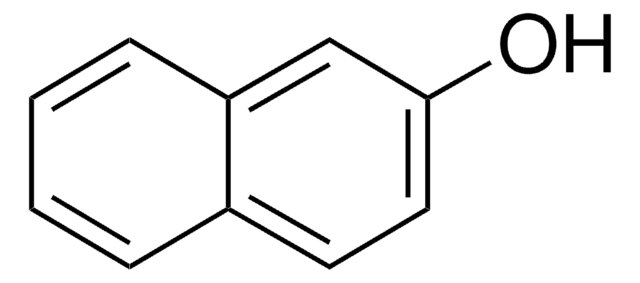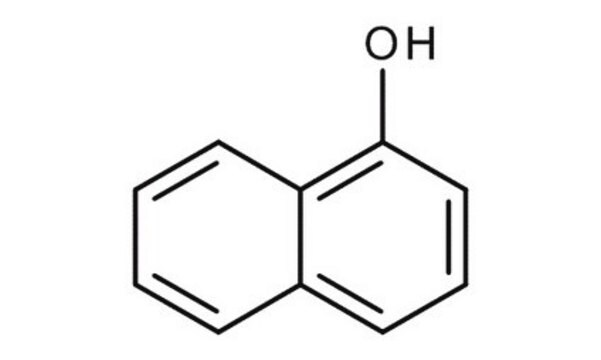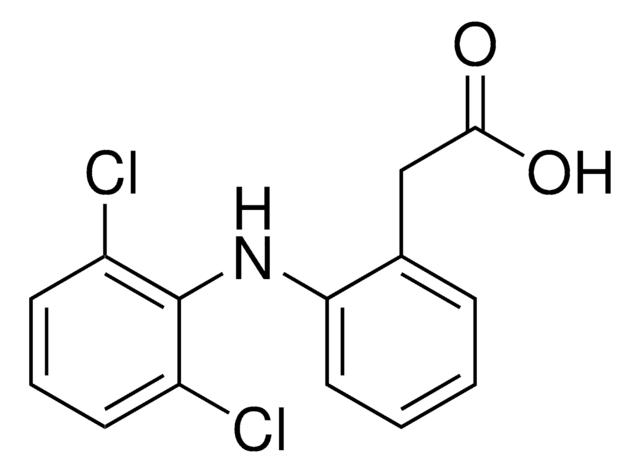N2780
1-Naphthol
BioXtra, ≥99%
Synonym(s):
α-Naphthol, 1-Hydroxynaphthalene
About This Item
Recommended Products
vapor density
4.5 (120 °C, vs air)
Quality Level
vapor pressure
1 mmHg ( 94 °C)
product line
BioXtra
Assay
≥99%
form
powder
autoignition temp.
1007 °F
expl. lim.
5 %
impurities
≤0.0005% Phosphorus (P)
≤0.1% Insoluble matter
ign. residue
≤0.1%
bp
278-280 °C (lit.)
mp
94-96 °C (lit.)
solubility
ethanol: 1 M, clear
anion traces
sulfate (SO42-): ≤0.05%
cation traces
Al: ≤0.0005%
Ca: ≤0.0005%
Cu: ≤0.0005%
Fe: ≤0.0005%
K: ≤0.005%
Mg: ≤0.0005%
Na: ≤0.005%
Pb: ≤0.001%
Zn: ≤0.0005%
application(s)
diagnostic assay manufacturing
hematology
histology
storage temp.
room temp
SMILES string
Oc1cccc2ccccc12
InChI
1S/C10H8O/c11-10-7-3-5-8-4-1-2-6-9(8)10/h1-7,11H
InChI key
KJCVRFUGPWSIIH-UHFFFAOYSA-N
Gene Information
human ... CYP1A2(1544)
Looking for similar products? Visit Product Comparison Guide
Signal Word
Danger
Hazard Statements
Precautionary Statements
Hazard Classifications
Acute Tox. 3 Dermal - Acute Tox. 4 Oral - Aquatic Acute 1 - Aquatic Chronic 3 - Eye Dam. 1 - Skin Irrit. 2 - Skin Sens. 1A - STOT SE 2 Oral - STOT SE 3
Target Organs
Kidney, Respiratory system
Storage Class Code
6.1C - Combustible acute toxic Cat.3 / toxic compounds or compounds which causing chronic effects
WGK
WGK 1
Flash Point(F)
257.0 °F - closed cup
Flash Point(C)
125 °C - closed cup
Personal Protective Equipment
Regulatory Listings
Regulatory Listings are mainly provided for chemical products. Only limited information can be provided here for non-chemical products. No entry means none of the components are listed. It is the user’s obligation to ensure the safe and legal use of the product.
ISHL Indicated Name
Substances Subject to be Indicated Names
ISHL Notified Names
Substances Subject to be Notified Names
JAN Code
N2780-BULK:
N2780-VAR:
N2780-10G:
N2780-100G:
Choose from one of the most recent versions:
Certificates of Analysis (COA)
Don't see the Right Version?
If you require a particular version, you can look up a specific certificate by the Lot or Batch number.
Already Own This Product?
Find documentation for the products that you have recently purchased in the Document Library.
Our team of scientists has experience in all areas of research including Life Science, Material Science, Chemical Synthesis, Chromatography, Analytical and many others.
Contact Technical Service









